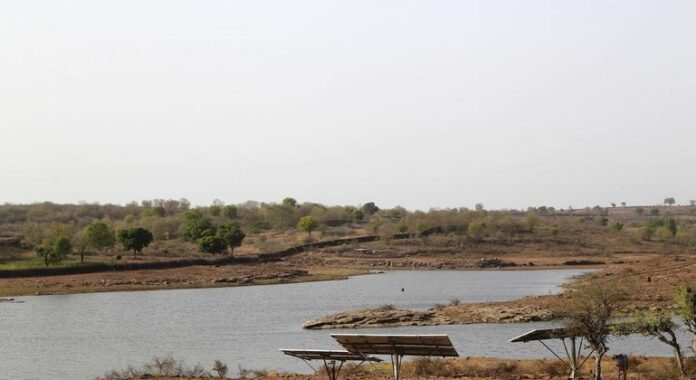Barki, a hilltop village in the rocky terrain of Rajasthan’s Karauli district, is called dang, meaning forest, but lacks natural resources and vegetation all around.
Only a few bushes or a few tree trunks can be seen far and wide in the village.
The people of Barki village have been locking their houses and moving to other areas during summer due to lack of water along with their cattle.
Every year in January-February when the rain water recedes, people move to other villages with their animals in search of water.
At the same time, women used to travel far and wide every day for drinking water and brought water from far and wide with pots on their heads.
A unique initiative changed the situation
But now the village has made tireless efforts to overcome the water problem by harvesting rainwater to improve its socio-economic status. Local NGO ‘Gram Gaurav’ helped the villagers in this effort and taught them soil and water conservation methods by making pokhras and paras (earthen dams).
The NGO Gram Gaur Sanstha here, with the help of UNICEF, has taught villagers soil and water conservation methods such as pokhras and paras (earthen dams).
Due to these efforts, farmers started farming and growing crops in the rocky plateau areas. This not only increased agriculture in these rocky areas but also ensured water availability.
UNICEF is the knowledge partner of Gram Gaurav Organization in this work from 2023 onwards, working closely with the institute to strengthen the climate change and environmental sustainability components.

Jagdish Gurjar, secretary of Gram Gaurav Sanstha, said, “Every year in January-February, the rainwater runs out and people move to other villages. Many villagers used to go far every day to fetch water. Now men and women do not work in mines.
He said, “But now the situation has changed. Due to the availability of water in villages, people are saved from being trapped in the vicious cycle of poverty and they are also saved from silicosis (a lung disease caused by inhaling siliceous sand). Now people work in their fields. Milk, food and water are also available in sufficient quantity.”

Women and child welfare
Addressing the water crisis, the initiative also provided relief to women who had to travel long distances to fetch water every day. Besides, improved care of children has also been made possible.
Under this initiative, solar powered sustainable practices for irrigation and forest conservation were promoted. In addition, the use of renewable energy sources has contributed to combating climate change and achieving environmental sustainability.
Barki resident Krishna Kumari Meena, 25, said, “The pond water helped us grow food and fodder. Earlier people used to work in mining, but now most people have started farming in villages.”
“Earlier, children missed school because they were forced to go long distances to fetch water every day. But now they go to school every day. Children’s health has also improved because they can now drink from common taps and clean their own water.” Water is available for cleaning purposes.

He credited the efforts of Gram Gaurav Sansthan for this, which enabled them to solve their water problems. This organization has worked with villagers to conserve rainwater in ponds. Village youth also participate enthusiastically and use traditional knowledge to make water management work possible.
The result of these efforts is that today the community is self-reliant, and is setting an example of resilience to climate change in the scorching heat of Rajasthan.

Community involvement
Rakesh Meena (34), a resident of Barki, said that all the youths of the village have helped in building an earthen dam on the banks of the pond to conserve rainwater. A youth group was formed in the village, which actively participates in the maintenance of the reservoir.
75-year-old Gopal Meena is one of these villagers who has become an agent of change in Barki, creating a livelihood for the villagers. Home-grown mustard and sacks of wheat are kept on the balcony of his small two-room house.
“Due to the water conservation programme, migration of distressed people (to Barki) has reduced drastically,” said Murari Mohan Goswami, a campaigner with Gram Gaurav Sansthan.

